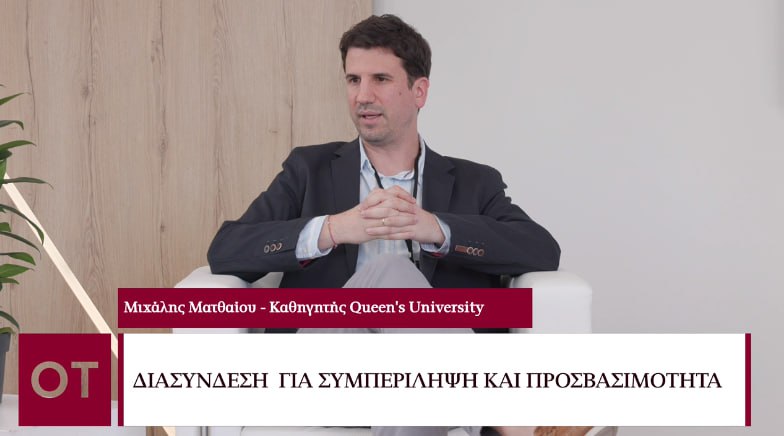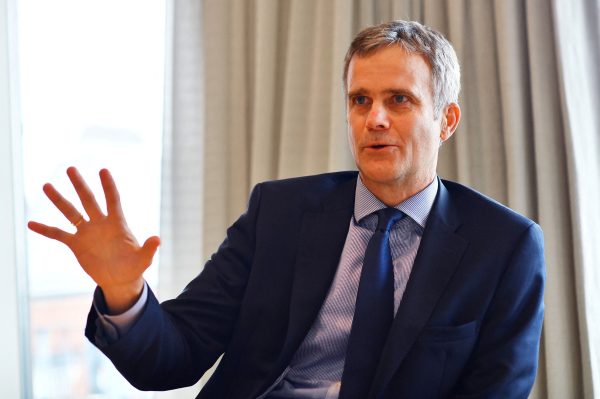
The time for the entry of 6G into our lives is counting down, with Michalis Matthaiou, a professor at Queen’s University, listing the two innovations of the new technology.
Speaking at the OT panel, on the sidelines of the Beyond 2023 exhibition, Mr. Mathaiou initially mentioned that Britain went from being a protagonist to a follower of developments and especially in 5G it was left behind and is now trying to re-enter the race.”
As far as Greece is concerned, the Queen’s University professor emphasized that our country has made significant leaps in technological penetration, however “there is no synergy in the universities and it is difficult to turn theoretical research into practice, this is much easier in Britain”.
Referring to the networks, he noted that each generation has an incubation period of 10 years, “for 6G to come out in 2030 we must now start research, which requires strong financial tools and synergies, while there is intense competition”.
Regarding the differences between 5G and 6G, Mr. Matthaiou emphasized that there are two main innovations: “we will shift to higher frequencies, we will talk about much faster speeds. But the radio coverage is decreasing. And secondly we will have the invasion of artificial intelligence, which raises bioethical issues and should be discussed.”
“We will see super-smart cities, changes in transport, ships, telemedicine, a coupling of biological and digital worlds. We will be able to communicate remotely with holograms, while in 2030 the mobile phone will be considered obsolete. But we have to say that artificial intelligence needs control and we have to open the box for limits.”
Latest News

Hellenic Food Authority Issues Food Safety Tips for Easter
Food safety tips on how to make sure your lamb has been properly inspected and your eggs stay fresh.

Greek Kiwifruit Exports Smash 200,000-Ton Mark, Setting New Record
According to data by the Association of Greek Fruit, Vegetable and Juice Exporters, Incofruit Hellas, between September 1, 2024, and April 17, 2025, kiwifruit exports increased by 14.2%.

Easter Tourism Boom: Greece Sees 18.3% Surge in Hotel Bookings
Among foreign markets, Israel has emerged as the biggest growth driver, with hotel bookings more than doubling—up 178.5% year-on-year.

Greece to Launch Fast-Track Tender for Offshore Hydrocarbon Exploration
Last week, Papastavrou signed the acceptance of interest for the two Cretan blocks, while similar decisions regarding the two Ionian Sea blocks were signed by his predecessor

American-Hellenic Chamber of Commerce to Open Washington D.C. Branch
AmCham's new office aims aims to deepen U.S.-Greece economic ties and promote investment and innovation between the two countries

Why Greece’s New Maritime Spatial Plan Is a Geopolitical Game-Changer
This landmark development is more than just a bureaucratic step — it's a strategic declaration about how Greece intends to use, protect, and assert control over its seas

Eurozone Inflation Eases to 2.2% in March
Compared to February, inflation decreased in 16 member states, remained unchanged in one, and rose in ten.

Bank of Greece: Primary Gov. Surplus €4.1b Jan.-March 2025
The data released today by the Bank of Greece revealed that the central government’s overall cash balance recorded a surplus of €1.465 billion in the first quarter of 2025, compared to a deficit of €359 million in the corresponding period of 2024.

Greek Government Reissues 10-Year Bond Auction for €200 Million
The amount to be auctioned will be up to 200 million euros, and the settlement date is set for Friday, April 25, 2025 (T+5)

Greece Defines Continental Shelf Limits and Maritime Zones in Landmark EU Document
The Maritime Spatial Planning (MSP) framework represents a comprehensive approach to spatial planning and is crucial for the successful development of a blue and circular economy








![Πλημμύρες: Σημειώθηκαν σε επίπεδα ρεκόρ στην Ευρώπη το 2024 [γράφημα]](https://www.ot.gr/wp-content/uploads/2025/04/FLOOD_HUNGRY-90x90.jpg)

































 Αριθμός Πιστοποίησης
Αριθμός Πιστοποίησης